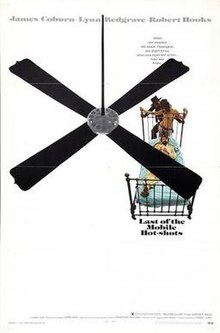
Dog Day Afternoon is a 1975 American biographical crime drama film directed by Sidney Lumet and produced by Martin Bregman and Martin Elfand. The film stars Al Pacino, John Cazale, James Broderick, and Charles Durning. The screenplay is written by Frank Pierson and is based on the Life magazine article "The Boys in the Bank" by P. F. Kluge and Thomas Moore. The feature chronicled the 1972 robbery and hostage situation led by John Wojtowicz and Salvatore Naturile at a Chase Manhattan branch in Brooklyn.

Network is a 1976 American satirical black comedy-drama film written by Paddy Chayefsky and directed by Sidney Lumet, about a fictional television network, Union Broadcasting System/Systems, and its struggle with poor ratings. The film stars Faye Dunaway, William Holden, Peter Finch and Robert Duvall and features Wesley Addy, Ned Beatty and Beatrice Straight.

James Harrison Coburn III was an American film and television actor who was featured in more than 70 films, largely action roles, and made 100 television appearances during a 45-year career.

Sidney Arthur Lumet was an American film director, producer, and screenwriter with over 50 films to his credit. He was nominated five times for the Academy Award: four for Best Director for 12 Angry Men (1957), Dog Day Afternoon (1975), Network (1976), and The Verdict (1982) and one for Best Adapted Screenplay for Prince of the City (1981). He did not win an individual Academy Award, but did receive an Academy Honorary Award, and 14 of his films were nominated for Oscars.

Orpheus Descending is a three-act play by Tennessee Williams. It was first presented on Broadway on March 17, 1957 but had only a brief run and modest success. It was revived on Broadway in 1989, directed by Peter Hall and starring Vanessa Redgrave and Kevin Anderson. The production ran for 13 previews and 97 performances.
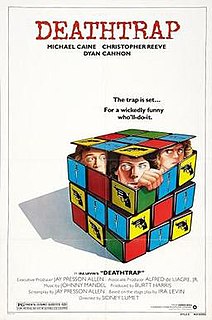
Deathtrap is a 1982 American black comedy mystery film based on the 1978 play of the same name by Ira Levin. It was directed by Sidney Lumet from a screenplay by Levin and Jay Presson Allen, and stars Michael Caine, Dyan Cannon and Christopher Reeve. Critics gave the film mostly favorable reviews, while noting its plot similarities to Caine's 1972 film Sleuth.
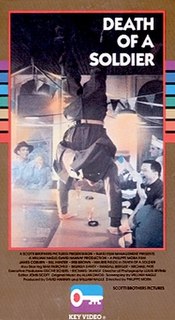
Death of a Soldier is a 1986 Australian film based on the life of American serial killer Eddie Leonski. The film was shot using locations around Melbourne, Victoria.

The Deadly Affair is a 1967 British neo noir spy film based on John le Carré's first novel, Call for the Dead, published in 1961. The film stars James Mason and was directed by Sidney Lumet from a script by Paul Dehn.

Jay Presson Allen was an American screenwriter, playwright, stage director, television producer, and novelist. Known for her withering wit and sometimes-off-color wisecracks, she was one of the few women making a living as a screenwriter at a time when women were a rarity in the profession. "You write to please yourself," she said, "The only office where there's no superior is the office of the scribe."

Ivan John Clark is an English actor, director, producer and writer. Clark is probably best known for his role as Just William in theatre and radio in the late 1940s and as the former husband of actress Lynn Redgrave, to whom he was married for 33 years. However, he established himself as a stage actor and director after moving to the United States in 1960, and became noted for directing plays featuring his wife in the 1970s beginning with A Better Place at Dublin's Gate Theatre (1973), then in America The Two of Us (1975), Saint Joan (1977–78), and a tour of California Suite (1976). In 1981, he co-directed the CBS television series House Calls, in which Redgrave starred.

Q & A is a 1990 American crime film written and directed by Sidney Lumet, based on a novel by New York State Supreme Court judge Edwin Torres. It stars Nick Nolte, Timothy Hutton, Armand Assante and Lumet's daughter, Jenny Lumet.
Fish is a British television drama series first broadcast on BBC One in 2000. It features Paul McGann as the title character, alongside Jemma Redgrave and Mick Ford. It was created by Stephen Tredre, written by Tredre and Matthew Bardsley, and co-produced by the BBC and Principal Pictures.
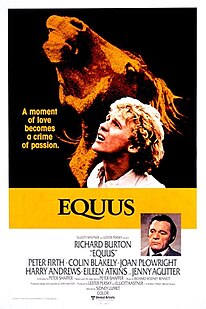
Equus is a 1977 psychological drama film directed by Sidney Lumet and written by Peter Shaffer, based on his play of the same name. The film stars Richard Burton, Peter Firth, Colin Blakely, Joan Plowright, Eileen Atkins, and Jenny Agutter. The story concerns a psychiatrist treating a teenager who has blinded horses in a stable, attempting to find the root of his horse worship.

Long Day's Journey into Night is a 1962 American drama film directed by Sidney Lumet, adapted from Eugene O'Neill's Pulitzer-winning play of the same name. It stars Katharine Hepburn, Ralph Richardson, Jason Robards, and Dean Stockwell. The story deals with themes of addiction and the resulting dysfunction of the nuclear family, and is drawn from O'Neill's own experiences. It was shot at Chelsea Studios in New York, with exteriors filmed on City Island.

Before the Devil Knows You're Dead is a 2007 American crime thriller film directed by Sidney Lumet. The film was written by Kelly Masterson, and stars Philip Seymour Hoffman, Ethan Hawke, Marisa Tomei, and Albert Finney. The title comes from the Irish saying: "May you be in heaven a full half-hour before the devil knows you're dead". The film unfolds in a nonlinear narrative, repeatedly going back and forth in time, with some scenes shown repeatedly from differing points of view. It was the last film directed by Lumet before his death in 2011.

The Seven Descents of Myrtle is a play in seven scenes by Tennessee Williams. It started as a short story, The Kingdom of Earth, which Williams began in 1942 while in Macon, Georgia, but did not publish until 1954, in the limited edition of his story collection Hard Candy. Williams subsequently adapted the story into a one-act play, "Kingdom of Earth," published in the February 1, 1967, edition of Esquire magazine. He then expanded that play into a full-length seven-scene version, premiered the following year in New York with the title The Seven Descents of Myrtle and published on October 31, 1968, by New Directions as Kingdom of Earth. Its title character is reminiscent of another Williams' heroine, Blanche Dubois in A Streetcar Named Desire.
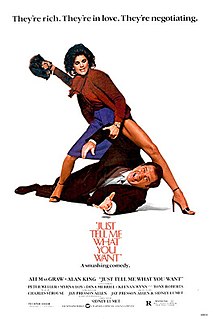
Just Tell Me What You Want is a 1980 American comedy film directed by Sidney Lumet. It stars Ali MacGraw, Peter Weller and Alan King, and was also Myrna Loy's final film.

The Sea Gull is a 1968 British-American drama film directed by Sidney Lumet. The screenplay by Moura Budberg is adapted and translated from Anton Chekhov's classic 1896 play The Seagull.

A View from the Bridge is a 1962 drama film directed by Sidney Lumet, based on the Arthur Miller play of the same name. The film was an international co-production between French and Italian studios, with exteriors shot on-location in Brooklyn and interiors filmed in Paris, France. It was written for the screen by Norman Rosten and Jean Aurenche, and stars Raf Vallone as Eddie Carbone, Maureen Stapleton as Beatrice, Carol Lawrence as Catherine, Jean Sorel as Rodolpho, Raymond Pellegrin as Marco, and Morris Carnovsky as Alfieri.

...One Third of a Nation... is a 1939 American drama film directed by Dudley Murphy and written by Oliver H.P. Garrett and Dudley Murphy. The film stars Sylvia Sidney, Leif Erickson, Myron McCormick, Hiram Sherman, the future director Sidney Lumet and Muriel Hutchison. The film was released on February 10, 1939, by Paramount Pictures.
